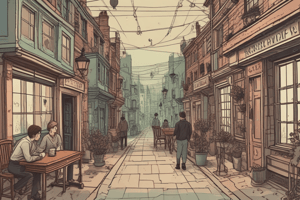Podcast
Questions and Answers
What was Napoleon Bonaparte's attitude towards newspapers?
What was Napoleon Bonaparte's attitude towards newspapers?
- He was afraid of them. (correct)
- He was indifferent towards them.
- He was supportive of them.
- He was dismissive of them.
What did the Chinese emperor do to scholars who refused to give up their book collections?
What did the Chinese emperor do to scholars who refused to give up their book collections?
- He rewarded them with money.
- He gave them a royal pardon.
- He had them exiled
- He had them executed (correct)
What has made words and images more powerful and widespread than ever?
What has made words and images more powerful and widespread than ever?
- Smartphones and social media (correct)
- The invention of movable type
- The building of the Great Wall
- Successful revolutions in many nations
What is the main purpose of news?
What is the main purpose of news?
What is the most important thing to consider when receiving and sharing news and information?
What is the most important thing to consider when receiving and sharing news and information?
What is an example of a modern leader successfully blocking material they do not want the people to see?
What is an example of a modern leader successfully blocking material they do not want the people to see?
What was the invention of movable type in the 15th century responsible for?
What was the invention of movable type in the 15th century responsible for?
Flashcards are hidden until you start studying
Study Notes
-
The invention of movable type in the 15th century allowed for the printing and publishing of information to masses of people.
-
French leader Napoleon Bonaparte feared four newspapers more than a thousand bayonets, and the Chinese emperor who oversaw the building of the Great Wall had scholars executed for refusing to give up their book collections.
-
Even powerful leaders in modern times have succeeded in blocking material they do not want the people to see, as in Russia and China.
-
But when true information is allowed to reach the people, good results can follow.
-
Information has fueled successful revolutions in many nations, and advances in media technology have made words and images more powerful and widespread than ever.
-
Smartphones and social media have become quick and easy tools to receive and share news and information.
-
These tools have even made it possible for anyonewith a device to gather and publish news.
-
This media environment makes it important for us to be able to recognize reliable information.
-
True information gives us the facts to guide our decisions and actions, and news can also divert our attention.
-
News can serve as a way to connect us as human beings, and it can also be a way to provide entertainment.
Studying That Suits You
Use AI to generate personalized quizzes and flashcards to suit your learning preferences.





